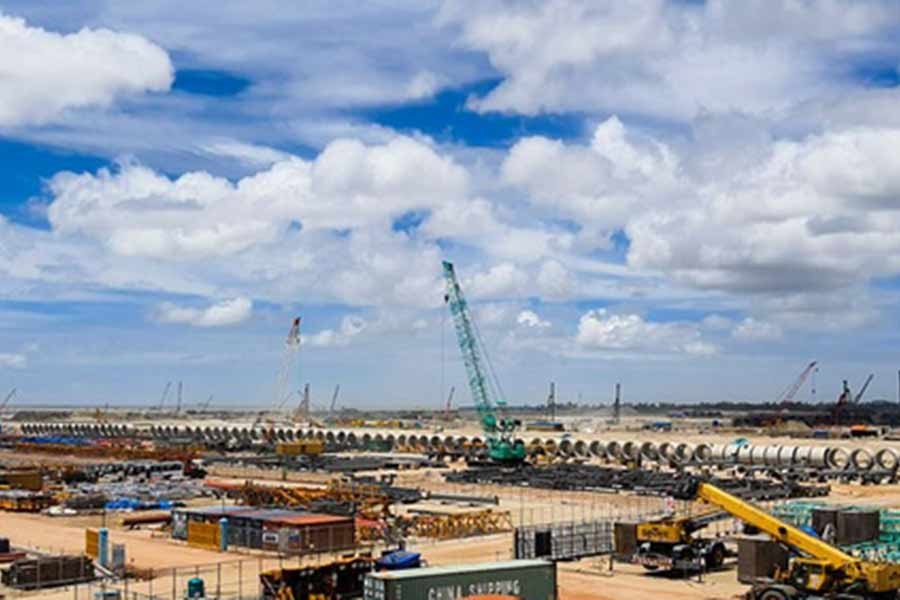Japan has requested Bangladesh to raise the budget and extend the deadline for projects it is financing and managing with an aim to make up for the losses inflicted by the coronavirus pandemic-induced disruptions.
The Economic Relations Division (ERD) of the Ministry of Finance asked officials involved in these projects to design a plan accordingly.
The Embassy of Japan in Bangladesh wrote a letter to the ERD in late February detailing the reasons for programmes not keeping to cost or schedule, says bdnews24.com in a report published on Monday.
The reasons behind the request included Covid-19 disrupting the work of the Japanese contractors and consultancy firms, and a spike in the cost of equipment following the easing of the pandemic, Muhammad Ashraf Ali Faruk, ERD’s joint secretary of affairs related to the United States and Japan, quoted the letter as saying.
The Japanese government cited a drop in productivity, higher expenses in health safety, and rising transport costs during the two years of the pandemic also converging to put pressure on the ongoing projects.
Japanese Ambassador in Dhaka Naoki Ito stressed the safety of these contractors and consultants appointed by the Japan International Cooperation Agency (JICA), the country's lending agency.
Japan is currently funding 33 projects in Bangladesh - most of which are being carried out by Japanese firms employed by JICA, which is financing several large-scale projects.
The letter said both parties need to discuss the extension of time and increasing the budget of the Japan-financed projects as per the contract guidelines and terms
“No one had control over the losses from the Covid-19 pandemic, which were not caused by any contractors or engineers working on these projects. The pace of work was stalled by the lockdowns and restrictions imposed during the time, including constraints on air travel as well.”
Upon receiving the letter, ERD Secretary Fatima Yasmin wrote to implementation authorities and directors of the ongoing projects in early March to advise them on the additional budget and time required to meet the request.
The Japanese embassy made no comments while attempts to reach the ERD secretary by phone went unanswered.
But Planning Minister MA Mannan said he had skimmed through the letter, "but I’ve nothing to do about it. It falls to the finance ministry”.
“JICA, ERD and related ministries will come to a decision on this and I'll give my opinions if they ask me,” he said and declined comment on the proposal.
According to ERD, Japan disbursed $17.45 billion of the $27.43 billion of its loan commitment until February.
Bangladesh is likely to enter its $3 billion 43rd loan package with Japan by June.
Work on the Dhaka Metrorail Line MRT-6, stretching from Uttara to Kamalapur, is scheduled to be wrapped by 2024. It is said to be the first among the ongoing megaprojects financed by Japan to be completed.
On Japan’s request to raise the budget and extend the time for the project, Managing Director of Dhaka Mass Transit Company Ltd MAN Siddique said, “We haven’t given any financial benefit to anyone. We're considering it.”
“Each of our contracts includes many provisions and we'll act accordingly. But it'll all take effect after the deal ends.”
“No one has had a hand in the [pandemic] they cited as the reason to make the request. Therefore, a logical decision may be taken after discussions between the two parties. But we'll do it after the end of the contract with Japan, not before that,” Siddique clarified.
The largest JICA-financed project is the Matarbari coal-based power plant construction in Maheshkhali, where a deep seaport will also be established. Japan is providing Tk 440 billion there
The island nation is also providing nearly Tk 1 trillion combined in three separate Metrorail projects in the capital, where almost Tk 250 billion is allotted for MRT-6 along with the proposed additional budget.
Japan is also providing Tk 120 billion for the Jamuna Railway Bridge Construction Project.
Dr Zahid Hussain, a former World Bank lead economist, said: “Japan is a tested friend of Bangladesh and an important partner in Bangladesh’s development. These facts should be kept in mind.”
He thinks Japan's request makes sense. “The government has to assess the proposal, have discussions, and take steps accordingly.”


